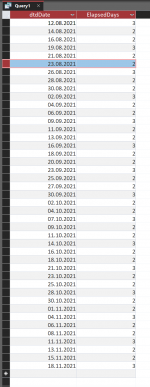Hi All
I am trying to calculate the elapsed time between 2 records in the same table. I have a table which records rainfall data per day. Obviously, not all days are recorded.
I need to know the number of days between 2 rain records so basically this is the elapsed time between the latest record and the one before that.
Is this possible?
Many thanks
I am trying to calculate the elapsed time between 2 records in the same table. I have a table which records rainfall data per day. Obviously, not all days are recorded.
I need to know the number of days between 2 rain records so basically this is the elapsed time between the latest record and the one before that.
Is this possible?
Many thanks

